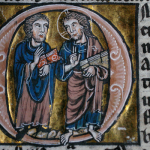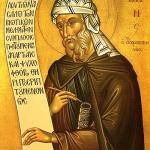Washington D.C., Jan 27, 2017 / 12:01 am (CNA/EWTN News).- Walk along in the March for Life or Walk for Life and you will see them: a swarm of women – many of them young – dressed in long blue habits, white veils blowing in the breeze. They are the Sisters of Life and they have a message for women and for the pro-life movement: “You are not alone.” “We really see ourselves primarily as a spiritual entity that intercedes for and upholds the work of the pro-life movement,” explained Sr. Mary Elizabeth, SV, Vicar General of the Sisters of Life. She also said she hopes that the pro-life movement knows that they can depend upon the Sisters’ prayers and support: “They are not alone and they have a family of Sisters who love them very much and are praying for them daily.” Joseph Zwilling, Director of Communications for the Archdiocese of New York, where the Sisters of Life were founded, said he believes the Sisters of Life have already made a tremendous impact on the culture since their founding. “It’s about 25 years later and the Sisters of Life are growing, they’re thriving and they’re everywhere” he told CNA.“Help Wanted: Sisters of Life” While it may be impossible to quantify the full impact of the Sisters’ prayers and efforts, Zwilling said, “I truly believe that they have helped through their prayer, through their example, they’ve helped to change people’s minds and hearts about this issue.” “I think that in the long run that’s going to be their greatest contribution.” The Sisters’ journey began in 1990 with a newspaper column by then-Cardinal John O’Connor of New York. “This really was the brainchild of Cardinal O’Connor,” Zwilling said. In the 1990s Cardinal O'Connor was a prominent leader in the pro-life movement in the Church and in the country, and saw the issue of abortion as one of the most pressing need of the time. Before acting, the cardinal reflected on the long history within the Church of the Holy Spirit giving life to religious communities able to meet these these challenges. Cardinal O’Connor suggested in his column that it was time for another order able to respond to the challenges of abortion. The piece was titled simply: "Help Wanted: Sisters of Life.” Eight sisters answered the call, formally founding a community on June 1, 1991. During this time, they lived temporarily with the Parish Visitors of Mary Immaculate in the Bronx, praying, fasting, attending Eucharistic adoration, and discerning their vocations. Sr. Josamarie, SV, was one of these first women to join the Sisters of Life. “None of us had been religious sisters before,” she said of herself and the other seven women who were part of the initial novice class. Moreover, God “called us from various things” – the young women had such backgrounds as scientists, college professors, and librarians. As the sisters prepared themselves for a life of prayer and ministry to the most vulnerable in society, Cardinal O’Connor also introduced the Sisters of Life to members of the pro-life movement, including Mother Theresa. Today, the order is thriving, with 106 Sisters, whose average age is around 35. In addition, the Sisters of Life are preparing for even more new sisters, with 15 postulants and 18 novices currently in formation. Sr. Mary Elizabeth joined the Sisters of Life in 1993 after graduating from the Franciscan University of Steubenville, having heard the cardinal talk on campus during her junior year. Already involved in pro-life activism, Sr. Mary Elizabeth explained that she “wanted to be part of the solution, offering other options to women” who felt like they had no options and turned to abortion out of desperation.A Life of Prayer The foundation of the Sisters of Life ministry and daily life is prayer and contemplation, explained Sister Mary Elizabeth. “Our spirituality is Eucharistic-centered and Marian,” she told CNA. In each of their convents, the Sisters participate in Mass and spend a Holy Hour in Eucharistic adoration daily. In addition, the sisters gather together to pray the Liturgy of the Hours throughout the day. As part of the group’s Marian focus, the Sisters of Life also pray a rosary together “to support the works of the pro-life movement in our country and throughout the world each day.” The Sisters of Life also draw upon the example of Mary in their spirituality, and from there, the way they engage other aspects of their lives: “A deep part of our spiritual life is living out a spiritual maternity, and so we take Mary as our model.” Sister Mary Elizabeth said the sisters’ goal is to carry Christ’s presence with them and to echo Mary’s “yes” to life and to Christ.The Sisters of Life from The Sisters of Life on Vimeo. One of the examples of Mary’s maternity they seek to emulate is her decision to journey forth and visit her cousin, Elizabeth, after the Annunciation. “Just as at the Visitation the presence of Jesus in Mary radiated out” and filled her cousin with joy, Sr. Mary Elizabeth said, “so we can have the same life and power dwelling within us and radiating out from us to touch all those women that we encounter every day who are pregnant and in need and hopefully them with joy and with hope.” The sisters also seek to bring the example of Mary’s receptivity and welcome into the way they treat people – by recognizing the unique dignity of every person. When sisters encounter someone, Sr. Mary Elizabeth said, “we’re not in a rush, we’re not in a hurry.” This patience and attention, she continued, is “deeply rooted in our belief that every human person is created as a unique manifestation of God.” “It’s a way we live out our spiritual maternity,” Sr. Mary Elizabeth noted. As a contemplative and apostolic order, however, their prayer life does not stop at the sanctuary doors, but carries over into their ministry, too. “Our prayer kind of fuels our apostolic efforts, and then our apostolate brings us back to prayer,” Sr. Mary Elizabeth noted. “We can bring all those people we are working with to the Lord throughout the day.”A Mission to Save Lives The ministry of the Sisters of Life’s apostolate is focused upon the defense of life in all its forms. Sisters in each of the convents participate in a range of missions, from ministry to women facing crisis pregnancies or regret after an abortion to study of bioethics and theology. At the center of the Sisters of Life’s apostolate is the Holy Respite Mission, a sanctuary in the Upper West Side of Manhattan for women in crisis situations to come and live with the sisters, join in the community and prayer life of the sisters, and stay until they are ready to go back into the world after the birth of their child. Women typically stay with the sisters between six months and a year. Just a few blocks uptown lies the sisters’ Visitation Mission, which offers “practical support and compassion to women who are pregnant and find themselves in a crisis,” Sr. Mary Elizabeth explained. “Most of the women that come to us have been abandoned be everyone and are unsure of what they’re going to do.” Every year, the Sisters of Life serve around 1,000 women each year. The sisters, along with a crew of volunteer lay helpers called the Co-Workers of Life, provide women with the practical support they need. “We provide everything,” she elaborated, enumerating a list ranging from physical needs like diapers, bottles, strollers, cribs, baby clothes, and maternity clothes, to other forms of help like helping women find safe housing, moving help, navigating challenges with college administrators or employers, writing resumes, and finding jobs. In addition, some Co-Workers of Life open their homes as a safe space for women in crisis and offer their friendship and support. Even simple gestures like meeting to talking or texting with expectant mothers can be an immense help for women with few other sources of support. “They’re being pressured into having an abortion by their family, by their friends, by the medical community, their employers – it’s really outrageous,” Sr. Mary Elizabeth exclaimed. “They just need someone who’s supporting them and encouraging them in their decision to keep their child.” Another important service the Sisters of Life provide is hope and healing outreach to women who have had abortions and are seeking healing. “From the beginning, Cardinal O’Connor was very sensitive to those who had suffered the wounds of abortion,” explained Sr. Josamarie. Many women, she continued, feel pressured into abortion and then are left to suffer through the emotions alone afterwards. Sisters provide opportunities to “work through” feelings of grief, anger and other emotions by counseling women, as well as offering specialized retreats where women also have access to the sacraments of Reconciliation and the Eucharist, in addition to someone who will listen to them as they process their experience. “It’s our experience that women hold this secret and don’t speak about it to others,” Sr. Mary Elizabeth added on the experience of post-abortive women. “It’s a tremendous burden that they handle alone.” Finally, the sisters engage in a range of outreach and evangelization activities through their retreat center in Stamford, Conn., and their presence at pro-life and Catholic events such as World Youth Day, and the March for Life in Washington, D.C. and the Walk For Life in San Francisco in January. These activities compliment the education work the sisters do through their pro-life library, their support of the Respect Life/Family Life Office for the Archdiocese of New York, research in their House of Studies in Maryland, and talks on college campuses and in parishes. With their lives dedicated to the defense of life every day of the year, the Sisters aim to revitalize a love for life in the world. Their hope, Sister Mary Elizabeth said, is to be “a spiritual force that generates a new culture of life within the minds of hearts of men and women across the world.” If the thousands of lives they touch every year are any indication, they are well on their way. Read more















